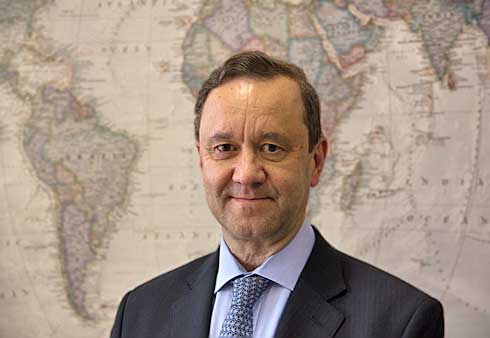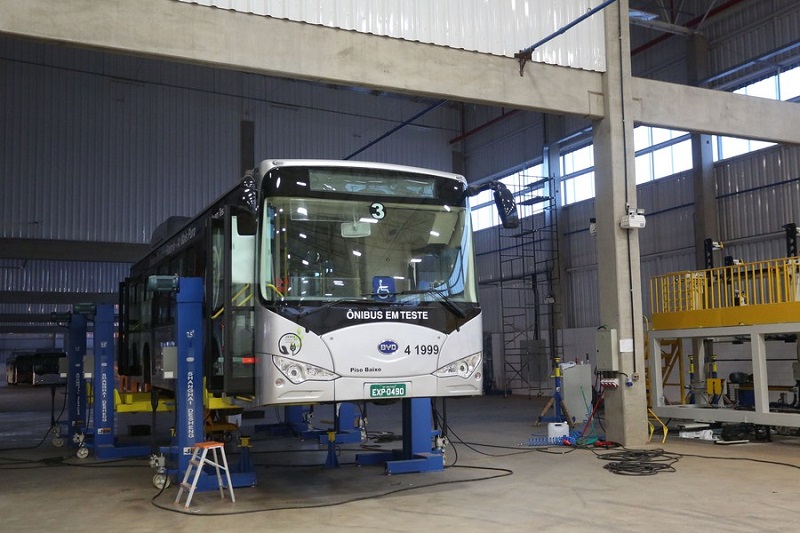Editor’s Note: China and Brazil are the largest developing countries in the western and eastern hemispheres. The Brazilian government attaches great importance to its relations with China and regards China as a stable and reliable cooperative partner of mutual trust. On the occasion of World Portuguese language day, Paulo Estivallet de Mesquita, Ambassador of Brazil to China, shared his insights into the bilateral relations in an interview with Ms. Sun Chao, the author of “Global Leaders on the Belt and Road Initiative”. Authorized by Sun Chao, the excerpts of the interview are published by China Focus.
Sun Chao: China and Brazil enjoy deepening political mutual trust, high economic complementarity and solid cooperation in trade and investment. How do you see the economic cooperation and cultural exchanges between the two countries?
Ambassador Paulo Estivallet de Mesquita: We are eager to work together with China to strengthen forward-looking market development, create better and stable conditions for expanding trade, and guide investment cooperation to burst into new vitality after the epidemic. The Brazilian embassy is willing to serve as a bridge for this purpose and believes that our two sides will continue to promote economic and trade cooperation in multiple levels and fields.
And what is more, China and Brazil have frequent exchanges in the field of culture and education despite the restrictions and difficulties brought about by the Covid pandemic. The Brazilian government and the Brazilian embassy have made great efforts to spread Brazilian culture. We have organized rich exchange activities in the fields of music, film, and food and so forth. We have also displayed them through our official microblog, website and some other platforms available to Chinese people.
Sun Chao: The Belt and Road Initiative (BRI) aims to create opportunities and connectivity for common development. How do you see the Belt and Road Initiative? And how to better participate in the BRI?
Ambassador Paulo Estivallet de Mesquita: China and Brazil are the two largest developing countries in the western and eastern hemispheres. The Brazilian government attaches great importance to its relations with China and regards China as a stable and reliable cooperative partner of mutual trust.
The Belt and Road Initiative is open to all interested countries and regions, including Latin America. Therefore, the Brazilian government highly appreciates that and is willing to promote the integration of its foreign policy with the BRI, expand cooperation in trade, science, technology, culture and other fields. As the Brazil ambassador to China, it is my responsibility and pleasure to enhance mutual understanding between our peoples, to promote the two countries stay in close coordination and to straighten the relationship in multiple levels and fields.

Sun Chao: 2022 marks the 48th anniversary of establishment of diplomatic relations between China and Brazil. In what way can China and Brazil advance the continuous and stable development of the bilateral relations? How to deepen our cooperation in the future?
Ambassador Paulo Estivallet de Mesquita: I think that in-depth international dialogues, including Belt and Road Ambassador Interview Program, serve as an integral medium to promote exchanges between countries and continue to utilize the partnership and to respect, trust, and support each other, especially in the new era when cultural and people-to-people exchanges have helped to increase mutual understanding. It has practical guidance for and significant value in broadening more international consensus and promoting the construction of BRI. The initiative is proposed to build “A community with shared future for all humankind”. As a national cooperation platform open to countries around the world, it is natural to receive different interpretations or even dissenting voices. Therefore, the key or the precondition is to let the world accurately and comprehensively understand the concept and operation of the Initiative. Those people possess a better insight about China as well as incisive understanding of their countries’ policies. It’s a remarkable way to display the international thinking and actions triggered by the Initiative, and to avoid mutual misjudgment caused by lack of communication mechanism or any other potential challenges.
Besides, more in-depth international dialogues such as the Belt and Road Ambassador Interview can provide both Chinese people and the people throughout the world with a fresh and objective perspective to observe China, to listen to different developing stories together with other countries, which will make for further strengthened communication and coordination. Through those vivid dialogues and exchanges, audience from all backgrounds can comprehend the spirit and very essence of the BRI, clearly know whether the proposal is effective and feasible, what their countries and the international community pay attention to, and what tangible benefits will be brought once those cooperative projects are implemented. For Brazil, the flourishing relations with China are basically determined by the interests of the two countries and rooted in commitment to mutual respect, equality and trust. Only by gathering more understandings, can BRI be able to receive valuable solidarity and support from our people and thus drive collective ways forward and do altogether construct good future.

Sun Chao: China has been Brazil’s largest trading partner in Asia for a few years. Brazil is the first Latin-American country whose bilateral trade volume with China has exceeded $100 billion. How to expand the mutual beneficial ties from trade to more areas in the future?
Ambassador Paulo Estivallet de Mesquita: As the largest developing country and major emerging economy in the eastern and western hemispheres, China and Brazil share a wide range of interests and have broad prospects for cooperation. The two countries are not only deepening cooperation in the traditional areas of agriculture, electricity, mining and infrastructure, but also fostering growth in new areas such as technology innovation and the digital economy. China is Brazil’s largest economic and trade partner in Asia, and the resources, markets, technologies and capital of the two countries are highly complementary.
Sun Chao: Mr. Ambassador, how to deepen mutual understanding between the two peoples, and carry forward our friendship from generation to generation?
Ambassador Paulo Estivallet de Mesquita: The Brazilian side is looking forward to more mutual visits and frequent exchanges in diverse fields, so as to enhance mutual understanding between our peoples and pass on the friendship from generation to generation. As I have already conveyed, language is an important part of bringing people closer together. Even though China and Brazil are far apart geographically, more and more dialogues between civilizations will help bring them closer in heart and spirit.
Despite being separated by mountains and oceans, the Chinese and Brazilian people are close in heart and soul. We will surely create a bright future together with the enthusiasm of friendship, mutual understanding, the spirit of solidarity and cooperation.
Sun Chao: Mr. Ambassador, I’m so glad to have this interview on the occasion of World Portuguese language day. Would you share a few thoughts with our audience?
Ambassador Paulo Estivallet de Mesquita: I am so glad to join the interview. The Belt and Road Ambassador Interview Program is inclusive. Audience from various backgrounds can appreciate the Interview, and can be inspired by every decision-maker at home and abroad. Although the Initiative is grand, it is closely related to our life. China’s development is closely linked to everyone’s life, and the development of the world. On the occasion of World Portuguese language day, I would like to congratulate you and the program a big success. And I am extremely happy to know that Ambassador’s views on the Belt and Road is published in the language of Portuguese in Brazil.